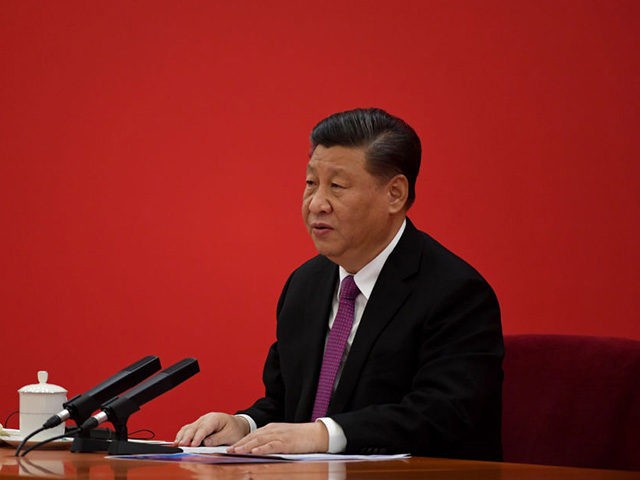Chinese government officials and state media were livid about American arms sales to Taiwan this week, vowing retaliation against the United States and punitive sanctions for every American company involved in the sales.
The Trump administration approved a $1.8 billion arms sale to Taiwan last week and another $2.4 billion sale on Monday. The first sale included land attack missiles and artillery, while the second includes up to 400 Harpoon coastal defense anti-ship cruise missiles. The Chinese Foreign Ministry announced unspecified sanctions on Monday against U.S. corporations involved in the sales, including Lockheed Martin, Boeing, and Raytheon.
China’s state-run Global Times on Monday furiously warned the governing Democratic Progressive Party (DPP) of Taiwan that it courts disaster by allowing the United States to use it as a puppet to “jeopardize the rise of the mainland” with “salami tactics” (The Global Times amusingly got carried away with its tirade and forgot to define the term, but salami tactics essentially means “divide and conquer”).
The Global Times said China’s “economic and military strength has developed rapidly and its ability to control the cross-Straits situation has become stronger,” so the DPP had better back away from its “secessionist activities” and embrace “peaceful reunification” before Beijing takes the island by force:
Military means are the mainland’s trump card for restraining Taiwan secessionists. Recently, the mainland conducted military exercises in the Taiwan Straits, and its military aircraft have reached near the island of Taiwan, sending a clear signal to the DPP authorities that they must rein in at the brink. Mainland public opinion is widely expressing expectations for the PLA fighter jets to fly over Taiwan. It is obvious that the PLA is making full preparations to exercise sovereignty over Taiwan.
This is beyond the DPP authorities’ expectations. They have been too arrogant. They took for granted that the Chinese mainland would only make oral threats instead of taking real action against their attempts to seek secession. Now they know how serious the situation is, while foreseeing the incoming punishment from the mainland. Media on the island believe that the two sides of the Taiwan Straits are reaching a “quasi war.”
According to the Global Times, “peaceful reunification” has many “tactic options,” including menacing Taiwan by flying warplanes through its airspace. The editorial made it clear that China is hoping Taiwan shoots at these fighter jets to give the Chinese People’s Liberation Army (PLA) the excuse it needs to strike a “fundamental blow” against Taiwanese dreams of independence and “show the world Taiwan’s true political status.”
“We should not indulge the U.S. in selling weapons to Taiwan. Taiwan authorities are a breakthrough point. They should pay the price for buying U.S. weapons, particularly offensive weapons. The PLA should warn them that it will destroy those newly purchased weapons,” the belligerent editorial concluded.
On Tuesday, the Global Times ran another editorial insisting the American weapons sold to Taiwan are “offensive, but useless.”
Specifically, the editorial claimed Harpoon missiles “won’t be able to threaten the PLA effectively,” but could “reach the coastal regions of the mainland,” implying Taiwan is buying them so it can threaten Chinese civilians.
Harpoon missiles are among the better anti-ship missiles in the world, with the latest Block II variants substantially improving on a venerable three-decade-old design. Taiwan already has an excellent road-mobile missile called the Hsiung Feng III. The point of the arms sale is to equip Taiwan with a large number of Harpoons to bolster its modest number of HF-IIIs, forming a multi-layered deterrent to Chinese amphibious assault.
The Global Times took great exception to U.S. assistance in developing Taiwan’s “porcupine” defensive strategy, rounding up “experts” to speculate that America is trying to swindle the Taiwanese by selling them old missiles the PLA can shoot down “easily.”
“The U.S. has a more advanced anti-ship missile with stealth capability, but it won’t sell it to Taiwan, so the latest announced sale is another expensive deal aimed at taking Taiwan taxpayers’ money with low-quality weapons, in other words, the U.S. is still treating the island as a ‘cash machine,’” the Global Times complained.
This was followed by a warning that China might just launch pre-emptive strikes against Taiwan before it can accept delivery of the supposedly useless American missiles, and a threat to lock any American company involved in arming Taiwan out of China’s “stable and profitable markets.”
Another Global Times editorial on Tuesday claimed the Taiwanese are terrified of entering a state of “quasi-war” with China. Taiwan and the United States were blamed completely for ratcheting up tensions and creating a “hostile” environment with peace-loving China.
“In face of collusion between the U.S. and Taiwan, the patrol of warships and warplanes from the mainland will become normal for the foreseeable future,” the article stated.
Taiwan objected to the increased number of threatening flights and intimidating military drills by China over the summer. In September, Taiwanese President Tsai Ing-wen said China’s military activities across the region “constitute a threat of force.”
China’s threats escalated considerably after U.S. Under Secretary of State for Economic Affairs Keith Krach visited Taiwan. The Global Times specifically referred to Crach’s visit and warned the United States not to allow any officials “whose position is higher” than Krach to visit Taiwan.

COMMENTS
Please let us know if you're having issues with commenting.